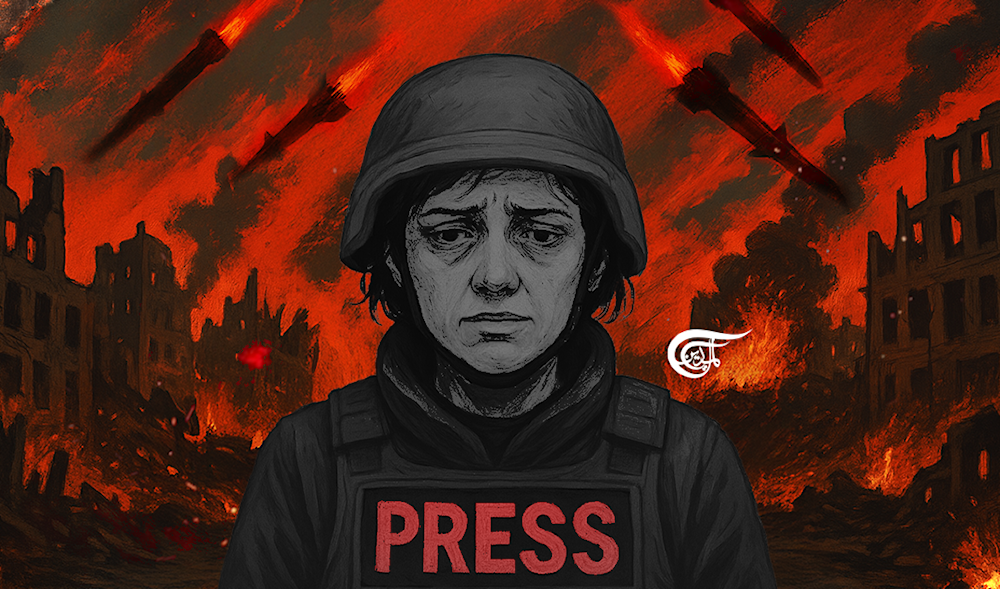Wartime journalism: The choices we make and the price we pay
This piece explores the contemplations and the moral duty of being a media worker in Gaza and Lebanon during wartime, when reporting under fire becomes a revolutionary act against colonial violence.
-

Wartime journalism: The choices we make and the price we pay (Illustrated by Ali al-Hadi Shmeis to Al Mayadeen English)
To be a journalist in wartime is to inhabit a terrain riddled with contradictions, none more jarring than the expectation to document atrocities while bombs fall around you.
But there was a time when the murder of a legally protected entity sent roars of condemnation throughout the globe, until the dehumanizing effects of colonialism, particularly on the individual, precisely on thought, transformed into a paradigm that dismisses every notion that has bound together the laws of this world.
By the laws, I mean the fictitious international law, which told us we, journalists and media workers, were protected, until “Israel” set the new precedent and devastated the world into a terrible dystopia that no longer hides its nonchalance for international law.
So, across Gaza and Lebanon, nearly 240 journalists have been deliberately murdered for conveying the truth.
For turning their jobs into sites of resistance, a battlefield in itself, they were targeted by warplanes and drones, executed, and burned alive.
The death of objective journalism
After October 7, 2023, almost all journalists became war correspondents. The likes of Farah Omar and Hossam Shabat, from South Lebanon to North Gaza, were not seasoned journalists, but marched onto the battlefield with a mission: Expose the occupation.
This was a turning point for the industry. Journalism shed its bourgeois skin and grew into something else entirely: an anti-colonial act. We were not merely documenting the bombing, we were exposing a brutal empire. And for that, we were punished.
To be clear: this is not a matter of press freedom in the abstract, but that of the empire’s need to silence those who name it; to maintain ideological control at a time of peak violence and suffering.
In Gaza, the Israeli occupation understands this better than most Western liberals. That is why journalists’ homes are bombed with their families inside and why their press vests became targets, not shields. The violence is intentional. The narrative must be sanitized, depoliticized, dehistoricized- anything but Palestinian.
From Lebanon, we watched our comrades in Gaza be systematically targeted and killed, then saw our colleagues targeted and killed.
Yet the West keeps upholding the illusions it imposed on us, the colonised, and tried to mold our careers into civic duty: neutral, balanced, professional. Our cameras are seen as weapons, and our identities are rendered "terrorist threats." More often than not, our colleagues' murders were justified through claims of military affiliations with Resistance movements.
This illusion is shattered when we realize that in our nations, which are occupied and under constant threat of bombardment and erasure, journalism cannot be neutral.
In a world carved by imperial greed, our neutrality quickly turns into collaboration and functions as a euphemism for obedience.
We either become a tool that the empire can exploit or a weapon against it. The choice is clear.
Our existence as truth-tellers becomes revolutionary. In the tradition of anti-colonial resistance, journalists refuse the occupation’s erasure not only with their bodies but with their words, not for the sake of liberal enlightenment but as liberation praxis.
It is rooted in land, in struggle, in blood. It refuses the logic of both-sides-ism, which has become a weapon of liberal complicity. That is precisely why Western media institutions will not protect them; their journalism is not designed to comfort the colonizer.
The complexities of being
I distinctly remember trying to rationalize my career throughout a war so violent that my duty became an existential test: How do we seek protection if no one holds our killers accountable?
The path we chose possessed such a personal dimension to it. We do not write from afar. The whirring of drones overhead rings clear in my ears, the trajectory of rockets we saw with our naked eyes, our homes have been cratered, and the blood of loved ones spilled.
I am reminded of Frantz Fanon’s insistence that decolonization is always a violent process because colonialism is extremely violent. For journalists embedded in the reality of a colonized life, there is no distance. The story is ours, and the risk is ours.
With our skin in the game, it becomes perfectly clear: Without a sharp analysis of our realities, we become complicit. Our media turns into a mere PR for our adversaries. Reclaiming the narrative, while the occupation and its complicit enablers try to erase us, happens through responding with documentation, language, and history.
We become witnesses, historians, and dissidents, and our work becomes sacred.
Read more: How language used in American media facilitates genocide

 5 Min Read
5 Min Read









